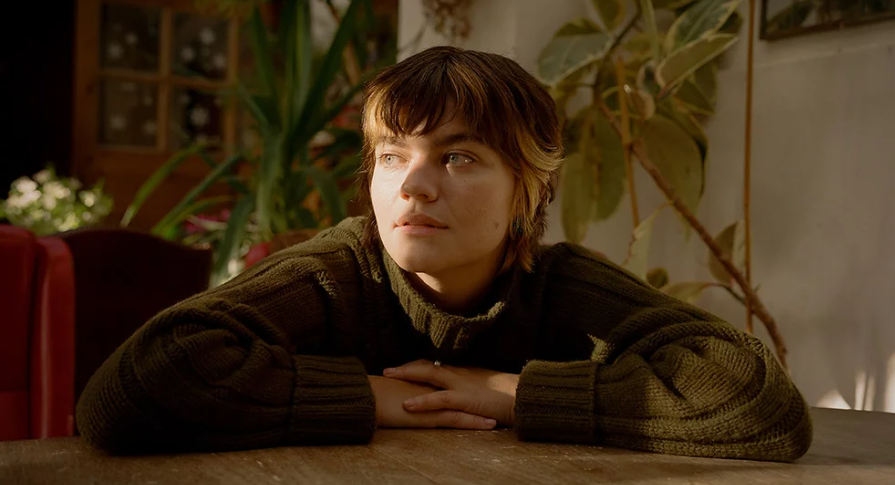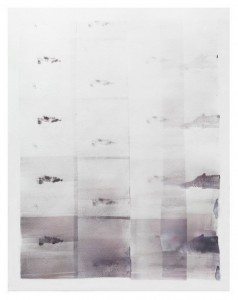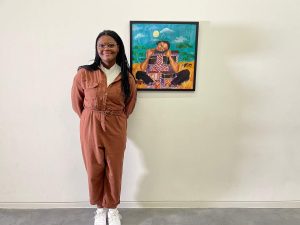In conversation with: Saba Sams
by Violet Aitchison | June 10, 2024

Throughout the years I have been reassured by many of the real adults in my life that ‘I shouldn’t be anxious for the future; most people don’t reach the top of their game until their 40s!’ I also find this sentiment is often echoed all over social media, with posts reminding us that ‘Samuel. L. Jackson didn’t get his breakout role until he was 45’, or ‘Helen Mirren shot to fame at 61 when she received her first Oscar nomination.’ The overarching feeling is that you shouldn’t get yourself down about not achieving success young. You have an abundance of time. However, it just takes discovering artists like Saba Sams for all these soothing words to come crashing down and remind you that some people really are just that good, that young…
At just 28, Saba Sams has achieved what most people strive for as long-term life goals. In 2022 she published her first book of short stories, Send Nudes, which became a Sunday Times Bestseller, and featured work which had won numerous prizes such as the BBC National Short Story Award. Just a year later she was featured in Granta’s once-in-a-decade ‘20 under 40’ list which has previously featured the likes of Zadie Smith and Martin Amis. All of this was also achieved whilst raising two young children. I was lucky enough to interview Sams about her work, and more specifically Send Nudes, which the Guardian described as an “exhilarating debut”. The book features 10 stories that “dive into the world of girlhood and immerse us in its contradictions and complexities… Send Nudes celebrates the small victories in a world that tries to claim each young woman as its own.” So, when I was bought this book by my mum a couple of months ago and realised it perfectly summed up every worry, complication, and joy of girlhood, I was—naturally—obsessed with Send Nudes from the very first story.
After lapping up the book in one sitting, I was instantly struck with how brilliant all the different friendships between women in Send Nudes were. Even if they weren’t the main narrative of the stories, there was always a beautiful relationship intertwined in the plot, which feels incredibly true of life: companionship with the women in my life certainly keeps my world spinning. However, I wondered if Sams felt that her focus on female friendship was reflective of our society. Did she feel like our culture tends to neglect these dynamics? “Yes!” I’d clearly hit the right note here, “the culture has been mostly interested in straight monogamous relationships for a very long time. I think things are changing though.” I feel optimistic alongside her. Sams tells me she’s “heard about the rise of celibacy with girls on TikTok.” It feels like our generation isn’t prepared to sacrifice as much within romantic relationships anymore and Sams is “excited about the future of how we’ll consider relationships, be they romantic, sexual or platonic. If we could dismiss the hierarchy involved, maybe we could make dating [men] healthy and fun.”
The beauty of these friendships that lie at the heart of Sams’s stories is often also that they are complex, at times toxic, and always extremely dynamic. ‘The Bread’ demonstrates Sams’s ability to delicately deliver the nuances of female friendship, as she tells a story of a young woman’s experience of having an abortion. Alongside the tenderly dealt with story of the narrator’s abortion, ‘The Bread’ presents a very real articulation of a tricky friendship between the protagonist and her friend Eliza. The two women have different mindsets towards sex. Whilst the narrator enjoys having a lot of casual, unprotected sex, Eliza “only fucked men who loved her.” This is just one of many tensions I noted between the women. Sams notes: “This friendship is funny to me… it’s so laced with jealousy, with self-doubt, that I don’t think anything either of the characters perceive about the other has much truth.” I know every woman in my life has been stuck in a friendship like the women in ‘The Bread’: a dynamic you know is definitely unhealthy, competitive, and probably not worth it in the long run, but one that you still feel a strange tug towards. A dynamic you might share with an old friend that you aren’t quite ready to let go of. Sams’s brilliance lies in her ability to eloquently and perfectly capture these messy relationships, that are often so hard to articulate in real time.
Aside from complicated friendships, some of my favourite parts of Sams’s work is her writing on motherhood. Sams has two young boys, and having first fallen pregnant at 22, she has frequently spoken about her own experiences as a young mother. She doesn’t shy away from the intensity of motherhood, candidly revealing: “Motherhood is a trip… I think it’s altered my work more than I could fully explain.” I wondered, considering the centrality of female relationships in her work, how she felt when she found out that she was having sons. She admits: “I was really shocked when I found out my first child was a boy. I didn’t think having a son was something that would happen to me.” Having a younger sister and growing up around a substantial group of brilliant women, this was somewhat unchartered territory for Sams. However, she acknowledges that her experiences since giving birth have rectified this shock: “In practice, it’s not been too different to having young daughters, as far as I can tell.” She says she’s “not someone who pushes their ‘boyness’ onto them, as you can imagine, they’re only five and two, so things are pretty fluid, and I hope they stay that way.”
Sams’s admirable perspective of motherhood shines through in her work, and she always seems to have a strong understanding of the young people in her stories. In one of the most striking tales, ‘The Mother and Girls’, the story ends with the nameless protagonists jumping from a trapeze platform when River, a boy to whom both girls form an attachment, refuses to choose between them after leading them both on. Next to Sam’s own experiences—jumping into motherhood earlier than is often conventional—it struck me that the theme of ‘choice’ might be especially pivotal in her work on girlhood and equally motherhood too. She expresses that “choosing to go through with motherhood after getting pregnant on the coil and 22 was the last reckless and naive choice I ever made.” And so, she agrees that “the whole experience of being a young woman for me, revolves around choice: how much choice we get; how we know whether or not a choice is actually ours; what choosing even looks like with so many complex power dynamics at play.”
For my last question, I (perhaps lamely) wanted to know how Sams feels about her success a few years on from her huge achievements. She admits: “I don’t know about success. There are so many things to want, all the time. It’s ridiculous.” To an outsider, Sams is certainly achieving more than most people her age, but she remains grounded, telling me that, as for the future of her work: “I intend to keep writing, to sell enough books to afford that, and to keep getting better.”
As I creep further into my twenties and face the reality that I am heading into the last year of my degree, Sams’s work seems to become more pertinent every day. I’ve always wondered when I’d truly start to know that I was making the right choices and going down the right path. I suppose, I thought, with every year, I’d get better at navigating womanhood. That getting older would make everything make sense. But Sams proves that youth is no boundary to success. In fact, Sams’s ability to narrate the experience of youth, and growing up, is her specialty. She parts the interview with a pearl of cool, collected wisdom she seems to weave into all her work.
Regarding her own success: “We’ll have to see. I hope not to get too hung up on it.”
You can plot and plan but then you might get pregnant at 22 or make Granta’s ‘20 under 40’ list at 27. Life is messy, but this mess is often what creates the most fulfilling and surprisingly brilliant experiences. Whether success comes at 25 or 55, I’ll try to take Sams’s advice and not get too hung up on it.∎
Words by Violet Aitchison. Image courtesy of Alice Zoo.




